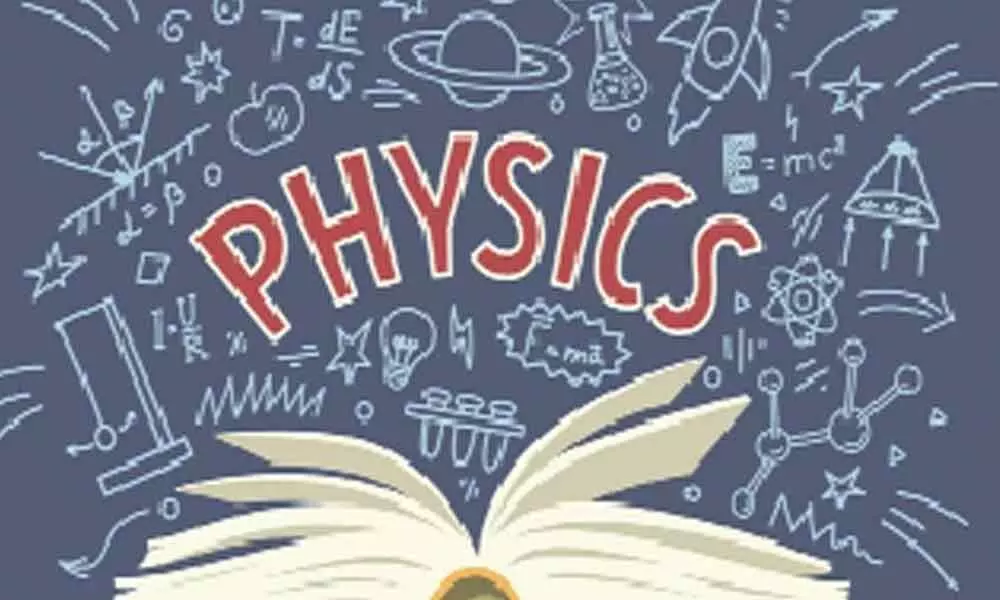Live
- IPL 2025 Auction: Ravichandran Ashwin, Rachin Ravindra return to Chennai Super Kings
- Manipur: After over a week's closure, regular classes to resume in educational institutions
- Govt open to discuss all issues, says Kiren Rijiju on eve of Winter Session of Parliament
- Pakistan reports three new polio cases, 2024 tally reaches 55
- Multifold Increase in migratory bird population at TN bird sanctuary
- Archaka Maha Sabha in Jogulamba Gadwal District Highlights Key Demands for Priests' Welfare
- IPL 2025 Auction: Both Rahul and Starc are world-class players, says Delhi Capitals head coach Badani
- Committed to the Welfare of Brahmins - MLA Kuchukulla Rajesh Reddy
- MLA Shri Ganesh Participates in Maha Sudarshana Homam and Srinivasa Kalyanam in Secunderabad
- Terror hideout busted in J&K's Kupwara district
Just In
From Phusis To Physics: It's time children are taught thoroughly basic concepts and their background


It’s time children are taught thoroughly basic concepts and their background
Where does the word ‘Physics’ come from? Response from the students who have studied reveals shocking results.
Where does the word 'Physics' come from? Response from the students who have studied reveals shocking results. Also, how the generations of students have been kept in dark about the basic concepts in the classrooms is surprising.
The students insist that there is an urgent need to revise the syllabus, the reason being that they feel deprived of a comprehensive understanding of even basic concepts properly in understanding how the subject they study converges with different fields, beyond science streams.
Take, for example, the Physics, Part-1 Textbook of Class XI, which claims that the word 'Physics' comes "from a Greek word meaning nature. Its Sanskrit equivalent is Bhautiki that is used to refer to the study of the physical world."
Highlight
Physics, Part-1 Textbook of Class XI, which claims that the word 'Physics' comes "from a Greek word meaning nature. Its Sanskrit equivalent is Bhautiki that is used to refer to the study of the physical world." However, according to experts, the real origin of the 'Physics' originates in the Greek word "Phusis" (Nature with life) akin to the word 'Prakruthi' of Sanskrit
However, according to the experts, the real origin of the 'Physics' originates in the Greek word "Phusis" (Nature with life) akin to the word 'Prakruthi' of Sanskrit. The derivatives from the Phusis are: "Phusika or Phusikos," of Greek, which mean natural things.
It was only the Latin word 'Physica' that the current usage of 'Physics' come from, and was put in currency from the 15th century. That apart, Greeks consider the world 'Phusis' as a feminine gender that of 'Prakruthi' of Sanskrit. However, by the time the word 'Physics' has come into usage, it turned out to be a 'gender-free concept.' Further, it deals with a lifeless inert material world and its laws.
The transition from Phusis to Physics and the later developments in science and technology covers a timeline of about more than 250 years. It presents the backdrop of social, cultural, political, economic, religious, gender issues, colonialism for exploitation of resources associated with the development of science and technology.
According to Prof Varada Rajulu, Department of Physics, Osmania University, "Every field converges with others at a certain point in higher studies.
Making students understand the basic concepts and their backgrounds within which the developments took place helps them to comprehend the interdisciplinary and multidisciplinary areas. Otherwise, students feel that they cannot question even what are called postulates in science. It fails students, to give enthusiasm to be creative in their studies."
Expressing a similar view, Prof G Nageswara Rao, Professor, Department of Inorganic and Analytical Chemistry, and former Vice-Chancellor of Andhra University, said that he studied Physics. But, the transition from Phusis to Physics and its backdrop was never part of the classroom teaching. Probably teachers of those times might not be aware of the same.
However, "it is important that students should know the basic concepts thoroughly and their background. It will make them not only interested in the subject but also make them creative in pursuing their field of knowledge, but also explore its inter-relatedness in the inter and multi disciplinary areas."
When asked, an IAS officer, who studied Physics at undergraduate and postgraduate levels, says, "Meaning of Physics and its origins is a basic question. We have never come across the transition from Phusis to Physics and its backdrop in the syllabus. It was also not taught by the teachers while taking the introductory lessons in the classroom."

© 2024 Hyderabad Media House Limited/The Hans India. All rights reserved. Powered by hocalwire.com






